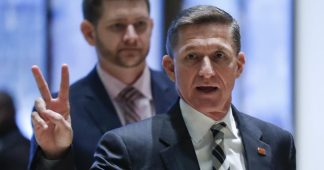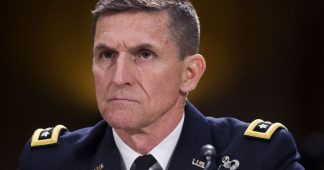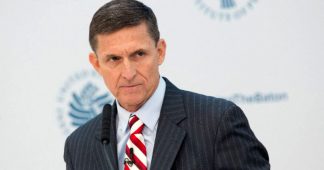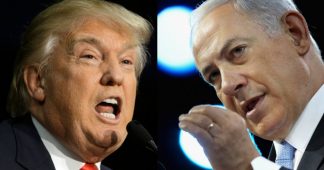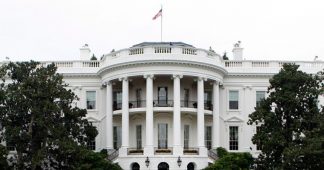By Aaron Maté, published in The Nation
Dec 5, 2017
Why are the media paying scant attention to Michael Flynn’s admissions about Israel?
The indictment of former national-security adviser Michael Flynn on December 1 has confirmed that Donald Trump’s inner circle colluded with a foreign power before entering the White House—just not the foreign power that has been the subject of our national fixation for the past year. To be sure, the jury is still out on Russia, though there are new grounds for questioning the case for a plot tying the Kremlin to Trump Tower. But with Flynn’s plea, we can now say for certain that the Trump team did collude—with Israel.
To recap, Flynn has pleaded guilty to lying to federal investigators about his conversations with then–Russian Ambassador Sergey Kislyak during the period after Trump’s November 2016 victory. As Foreign Policy previously reported, Flynn reached out to Kislyak as part of “a vigorous diplomatic bid” to undermine President Obama’s decision to allow a December 2016 Security Council resolution condemning illegal Israeli settlement building in the Occupied Territories. The indictment fills in some details.
According to the charge sheet, Flynn first made contact with Kislyak to discuss the Israel vote. We found out this weekend his reason for doing so. “[Special counsel Robert] Mueller’s investigators have learned through witnesses and documents that Prime Minister Benjamin Netanyahu of Israel asked the Trump transition team to lobby other countries to help Israel,” The New York Times reported after Flynn’s court appearance on Friday. “Investigators have learned that Mr. Flynn and [Trump son-in-law Jared] Kushner took the lead in those efforts”—efforts which failed to change a single vote, including Russia’s, which backed the measure in defiance of the Trump-Netanyahu subversion attempt.
In short, the first known contact between the Trump campaign and Russia after the election occurred in the service of a different foreign power, Israel, and was ultimately fruitless.
The next contact between Flynn and Kislyak was more productive. In late December, Obama imposed new sanctions on Russia for its alleged meddling in the 2016 election. A day later, Flynn called the Russian ambassador to request that the Kremlin, according to the plea document, “only respond to the U.S. Sanctions in a reciprocal manner.” Flynn’s overture came after a Trump transition colleague told him that the incoming administration “did not want Russia to escalate the situation.” By all accounts, Russia complied.
Whatever one thinks about this covert attempt to reduce tensions with a nuclear-armed power, it demonstrates an effort by the Trump transition, as with the Israel vote, to undermine the outgoing administration’s policy. Trump critics have seized on that as a violation of the Logan Act, which bars citizens from having unauthorized negotiations with foreign governments in a dispute with the United States. But the Logan Act has seldom been used except as a partisan talking point, not a prosecutable offense. More importantly, there’s the question as to whether Flynn’s overture on sanctions prove a quid pro quo [a favor or advantage granted or expected in return for something].
Notwithstanding the post-election contact with Flynn, not only has Russia failed to gain a reduction in sanctions but its relations with Washington have deteriorated. In early August, Trump signed new sanctions on Russia overwhelmingly approved by Congress. The administration recently presented lawmakers with a list of targets that “reads like a who’s who of the Russian defense and intelligence sectors,” The New York Times noted. In September, Trump shut down the Russian consulate in San Francisco and two annexes in New York City and Washington, DC. Just last week, Secretary of State Rex Tillerson denounced Russia’s “malicious tactics” against the West and vowed that sanctions imposed over Russian’s role in Ukraine “will remain in place until Russia reverses the actions that triggered them.”
Meanwhile, Trump has enlarged NATO over Russia’s objections, carried out the “biggest military exercise in Eastern Europe since the Cold War” on Russia’s border, appointed several anti-Russia hawks to key posts, and continues to deliberate over whether to supply Ukraine with a weapons package that Obama himself rejected out of fear it would worsen the country’s civil war.
In the latest flare-up, Russia has ordered international media outlets to register as foreign agents in retaliation for the Justice Department first doing so to Washington-based RT America.
It is, of course, possible that all of this is an elaborate ruse to mask the secret, as yet unproven, conspiracy that many insist will lead to Trump’s downfall. The fact that Flynn is now a cooperating witness has refueled hopes that this day is finally approaching. After all, why would Flynn lie about his contacts with Russia if he did not have something to hide? And why would Mueller offer him a plea deal if Flynn wasn’t offering him a bigger fish to fry? (One plausible motive, as Buzzfeed notes, is that Flynn may have lied to hide his potential Logan Act violation.)
Only time will tell whether Flynn has something to offer Mueller, or whether Mueller has gotten from him what he can. In the meantime, more than a year after the election, we still have exactly zero evidence of any cooperation between the Trump campaign and the Russian government—nor, it must be repeated, any evidence to back up U.S. intelligence officials’ claims that the Russian government meddled in the election. We do have instances of Trump campaign figures’—namely, Donald Trump Jr. and low-level adviser George Papadopoulos—making contact with people that they thought were Russian government intermediaries. But whatever they were told or believed, there is still no proof that their contacts led to an actual Kremlin connection.
What we do have is evidence that the Trump campaign colluded with Israel to subvert the U.S. government’s official position at the United Nations Security Council. Yet reaction to that news has been quite a departure from the standards of Russiagate when it comes to foreign meddling.
The contrast was put on stark display on Sunday, when Jared Kushner appeared with billionaire Israeli-American media tycoon Haim Saban at the latter’s annual forum on U.S.-Israel relations. Saban took a moment to thank Kushner for his role in the subversion effort that Flynn admitted to have undertaken on Israel’s behalf. “To be honest with you, as far as I know there’s nothing illegal there,” Saban told his stage companion. “But I think that this crowd and myself want to thank you for making that effort, so thank you very much.”
For all of the fears of Russian oligarchs’ having influence over Trump, the comment from this American oligarch reveals a great deal about who really influences practically everyone in Washington, Republican or Democrat. Saban was not a Trump donor. He is, in fact, Bill and Hillary Clinton’s top all-time financial supporter, to the tune of more than $25 million; a benefactor whose generosity has helped build not just the Clinton Library but also the Democratic National Committee’s headquarters.
But there has been no outrage from democracy-defending #Resistance stalwarts over Saban’s comments (and the Israeli subversion effort he endorsed). The same for news of Kushner’s failure to disclose his leadership of a group that funded the illegal Israeli settlements that he tried to protect at the United Nations. And now we await to see how those who agonize over foreign influence on Trump will respond to his reported plans to move the American embassy to Jerusalem—”a decision that would break with decades of U.S. policy and could fuel violence in the Middle East,” as Haaretz notes.
It is unlikely that Trump will be challenged on Israel, because his approach is harmonic with a bipartisan consensus cemented in large part by the financial contributions of billionaires like Saban and his Republican pro-Israeli government counterpart, Sheldon Adelson. Hence, there are no editorials or opinion pieces denouncing Israel’s ‘Plot Against America‘ or ‘War on America‘, or warnings that ‘Odds Are, Israel Owns Trump‘, or explorations of ‘What Israel Did to Control the American Mind‘. Likewise, there will be no new groups forming dubbed the ‘Committee to Investigate Israel‘ or the ‘Tel Aviv Project‘. In fact it is more than likely that, going forward, the media will give Israelgate the same treatment as cable’s top Russiagate sleuth, MSNBC’s Rachel Maddow, gave during her exhaustive Flynn coverage so far, which is to not even mention it.
This weekend furnished us with another important contrast. Flynn’s indictment was followed hours later by the passage of the Senate Republican tax bill, which stands to be one of the largest upward transfers of wealth in U.S. history. If protecting democracy is our goal, we may want to tune out the Russia-obsessed pundits and look closer to home.
* Aaron Maté is a host/producer for The Real News Network.
Published in www.newcoldwar.org
(New Cold War: Ukraine and Beyond)
